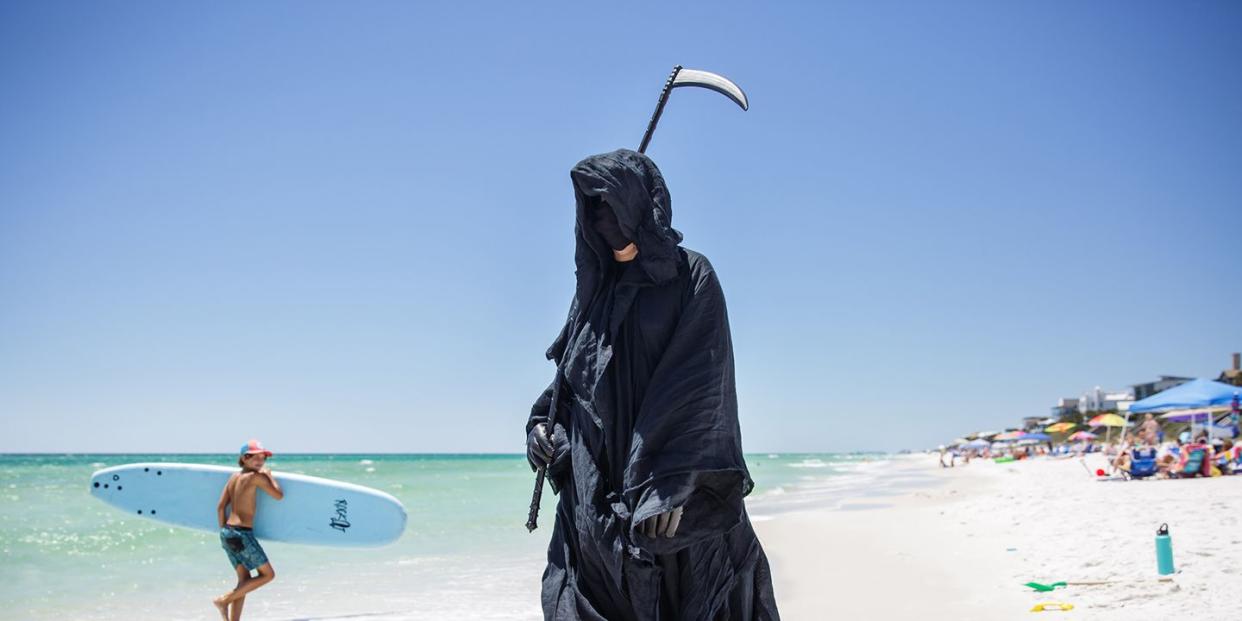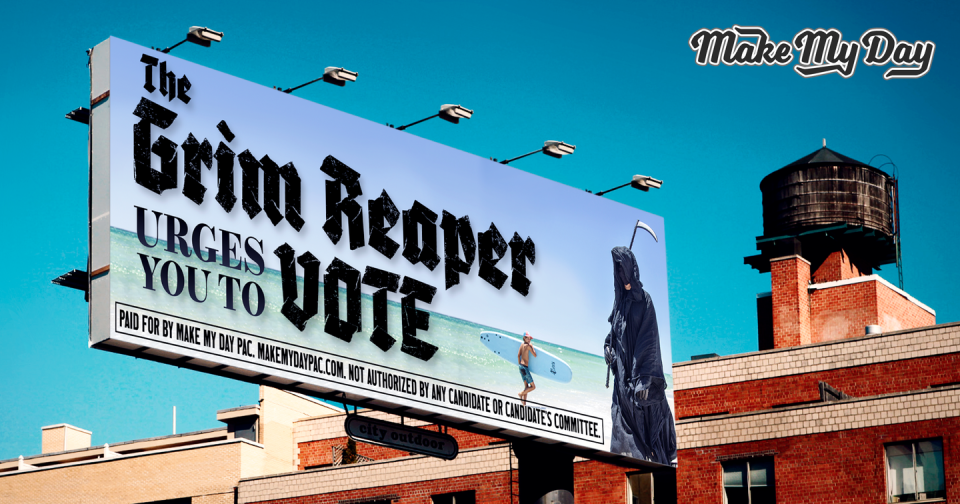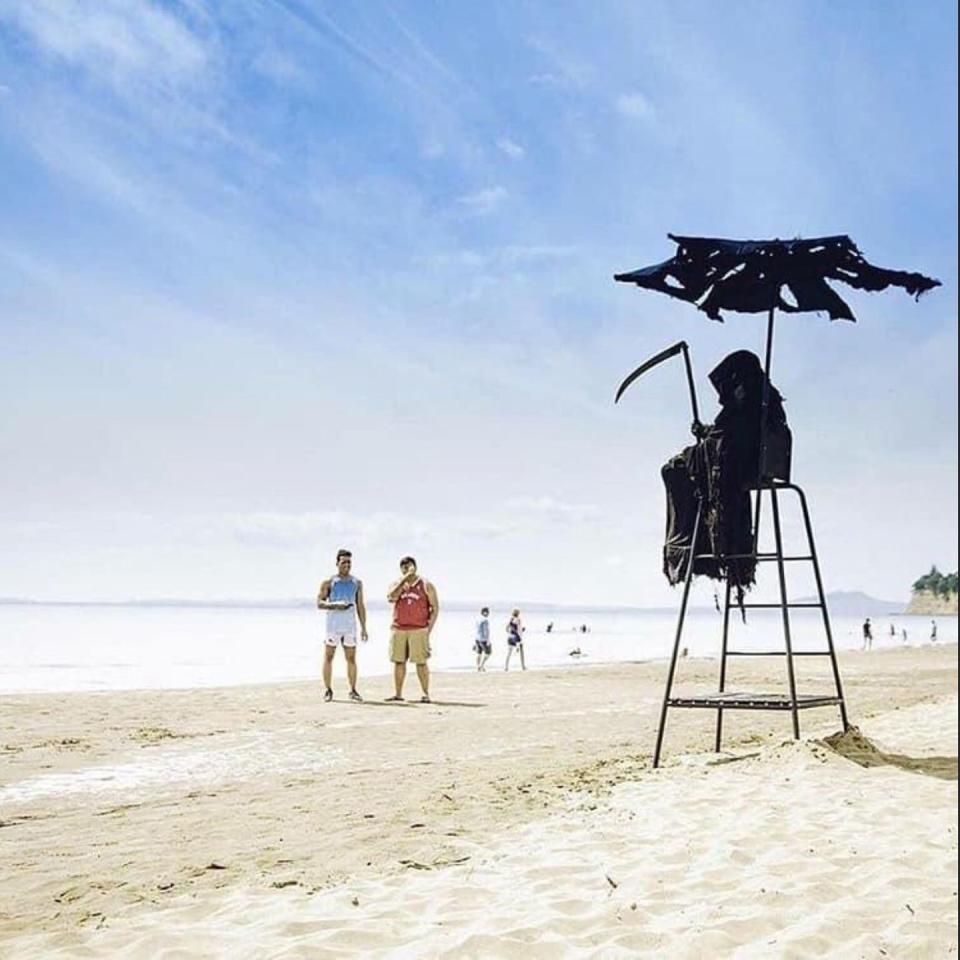Florida's COVID Grim Reaper Isn't Finished Yet

The Grim Reaper wears flip flops. He stands outside the courthouse in Santa Rosa Beach, Florida, open for the first day of early voting. It’s a seaside town—part of a hundred-mile strip of white sand beaches in the Florida panhandle known as the Emerald Coast—and voters are trickling in wearing cargo shorts and sundresses, seemingly unmoved by the black-hooded figure.
Two days earlier, Florida broke its record for the highest single-day increase of coronavirus cases: 5,558. The same day, Governor Ron DeSantis announced he was loosening rules for visits to long-term care facilities, envisioning families together for Thanksgiving.
Two women, one waving small American flags, stop for a selfie with the Grim Reaper. “Don’t get too close. I haven’t voted yet,” he tells them. “The Grim Reaper’s here to vote.”
The Grim Reaper sighs, heads toward the courthouse double-doors. He votes without incident and doesn’t take an “I Made Freedom Count: I Voted” sticker.
Daniel Uhlfelder is a 48-year-old trial attorney. “Lawyer, husband, father, and budding activist” is how he introduced himself recently. He divides his time between his beachside law office—litigating divorces, shoring up property sales; his family, including an 11-year-old son and 9-year-old daughter; and, lately, touring Florida as the Grim Reaper, urging people to wear masks and social distance.
This is new for him. Before the 2016 election, Uhlfelder used his wife’s Facebook account. Now he’s got 178,000 Twitter followers. He recently bought eight billboard ads (“The Grim Reaper Urges You to Vote”). His Grim Reaper activities now occupy many hours of a typical week.

When COVID-19 was officially declared a pandemic on March 11, Uhlfelder shut down his office. He and his family cancelled an upcoming trip to Spain. One day, he stopped by a paint store to buy some masks and, on an impulse, grabbed some protective coveralls.
The cashier taunted him, “Are you getting ready for the zombie apocalypse?”
He later noticed a nearby beach packed with spring breakers and young families. “It was bizarro world,” Uhlfelder says. “I'm watching people dying. I said, Well, maybe I should throw this paint suit on and go walk on the beach and figure out what these people are thinking.”
Uhlfelder filmed himself talking with college students. In the video, he holds a gas mask to his face, trying project over the noise of the waves. The students give him a lot of reasons for being there: they couldn’t cancel their travel reservations; they’re not elderly; everything’s been overblown by the media.
He posted the video on his Twitter page, giving it the title, “Update from Florida.”
holy shit pic.twitter.com/rVw24plXTp
— Adam Parkhomenko (@AdamParkhomenko) May 1, 2020
Uhlfelder didn’t blame the students much. What he saw instead was “a big disconnect” between beachgoers and Florida’s leadership. “Maybe it wasn't the smartest thing, but when they looked, everything’s open,” he says. “The governor says it’s open.”
Uhlfelder talks directly into the camera: “Apparently the word is not getting out there’s a serious virus going on—and the government’s not telling people the truth that they need to stay inside.”
A couple days later, still wearing his paint store suit, Uhlfelder drove two and a half hours to Tallahassee and tried to meet with Governor Ron DeSantis. The sole person still working the front desk turned him away. The next day, the governor’s office closed to the public and hasn’t reopened.
Uhlfelder sued the governor, using his own name.
“He had, in my mind, a constitutional obligation to protect the health and safety of his citizens. And I believe that he violated it,” Uhlfelder says. He circulated online petitions to shut down Florida’s beaches, gathering 413,000 signatures (and counting). In Walton County, where Uhlfelder lives, he successfully filed a lawsuit with 15 other property owners and got the beaches closed for three weeks in April. He did the same thing in two other counties and at Clearwater Beach.
But when Walton County announced plans to reopen beaches on May 1, as Florida’s cases ticked up, Uhlfelder told his wife he needed to do something drastic.
“People were not getting the message,” he says. “A hazmat suit, suing the governor, doing social media campaigns—it was having an impact, but some guy walking on the white sand beaches in a black Grim Reaper outfit? That’s a pretty stark image that you really can't dance around.”
Ten days before the scheduled reopening, Uhlfelder announced on his Twitter feed: the Florida Grim Reaper Tour.
Today I began touring Florida as the Grim Reaper to remind Floridians of the importance that we stay home and protect one another. This is just the beginning. Thank you for the support received from all over the world. pic.twitter.com/aVPICTxebE
— Daniel Uhlfelder (@DWUhlfelderLaw) May 2, 2020
“Many of you have asked if I am willing to travel around Florida wearing Grim Reaper attire to the beaches and other areas of the state opening up prematurely. The answer is absolutely yes,” Uhlfelder wrote.
At first, he had a store-bought Grim Reaper costume.
“I got a lot of comments like, ‘I hope you die in that outfit on the beach,’” Uhlfelder says. “I said, Well, that’s a good point. It might be a little hot.”
Also, the store-bought costume didn’t look “real” to him. So he asked a friend to custom-make a cloak and hood for him out of linen, which would be breathable and cool.
Starting in his office, Uhlfelder changes out of a suit and sleek blue tie. He puts on a black Stanford T-shirt—his alma mater—and pulls the Reaper cloak over both his arms like a monk’s robe. He swaps out wire-rim glasses for beach shades, black dress shoes for his flip-flops. On his desk is a box his sister gave him, with a George Patton quote: “Better to fight for something than live for nothing.”
May 1: The Grim Reaper pulls his white four-door sedan up to Miramar Beach, access point #49, along the Emerald Coast. The bottom of his ankle-length black cloak gets caught in his car door. Stepping out, he frees it, and emerges wielding a scythe with two hands, in black leather gloves.
People are filming him on their phones. A dog barks wildly at him. The beach is bustling.
Two different news crews trail the Grim Reaper as he ambles down to the shore.
It’s dangerous, it’s too soon, he warns them—at one point ominously coming up behind an on-air reporter—then resumes walking along the white sand.
Women in bikinis, mothers and children sprawled out on beach towels, sit and stare, wide-eyed, open-mouthed.
“Hey Corona Reaper, you know you’re scaring the children, right?” a woman asks him.
“The virus kills,” he tells her, his voice slightly muffled behind a black mask. That week, Florida topped 34,000 coronavirus cases—and his is the only mask in sight.
Beachgoers laugh, smirk, look on disapprovingly. For a few minutes, the Grim Reaper stands in a lifeguard tower, looming.
“You’re an asshole!” a man in retro square sunglasses shouts at him.
“Thank you, I’ll see you soon,” the Grim Reaper replies.
At one point, he walks barefoot along the beach, dangling his flip flops in one hand, while still holding his scythe in the other.

Later, someone calls the cops, and they show up, accusing him of trespassing, asking to see ID. The Grim Reaper doesn’t have any ID on him. No pockets.
“I'm a private citizen, you know. I mean, why am I out here doing this?” Uhlfelder asks. “Why is some lawyer having to run around in a Grim Reaper outfit to get people's attention? Because leaders on both sides are not doing what they’re supposed to.”
After that first beach walk—a clip of the Grim Reaper hovering behind an ABC 13 news reporter went viral—“it was like everyone in the world wanted to talk to me,” Uhlfelder says. Inside Edition, Newsweek, CNN, The Guardian—he was even honored with a joke on Saturday Night Live. Uhlfelder says after the SNL joke, his family started taking his new persona seriously. He started fielding Grim Reaper requests from other states.
“It went from zero to a thousand, like, immediately,” he says.
Uhlfelder’s Grim Reaper is—to answer his “why” question—an act of protest, something he felt driven to after the traditional avenue for seeking justice, the law, had failed.
I came upon Uhlfelder’s videos while locked in my house, watching the accelerating crisis. I’d been asking myself what an average person could do anymore to change anything; VOTE wasn’t cutting it. And there was Uhlfelder as the Grim Reaper, negotiating this same question, in the most ridiculous, public way.
The Grim Reaper was an answer—or at least, a disruption.
One of Uhlfelder’s worries is that he might be thought of as a novelty act. When Uhlfelder told his father about the Grim Reaper, his dad advised him not to be a “stunt guy.”
Uhlfelder’s father is a lawyer, too, with a reverence for public service. His grandfather escaped Nazi Germany after his parents—Uhlfelder’s great grand-parents—were killed in a concentration camp. After fleeing to West Palm Beach, Uhlfelder’s grandfather protested for civil rights in the 1950s.
Uhlfelder senses his place in this lineage and knows that his is an age of spectacle—“This is not a nuanced time,” he says. But he also knew his father was right. “Trump’s a stunt guy. Gaetz is a stunt guy,” he says, referring to his congressman, Republican Matt Gaetz, who in March made light of the virus by wearing a gas mask on the House floor. (After one of his constituents died from COVID-19, Gaetz denied the mask was a joke, saying he was “quite serious.”) “And they don’t do anything.”
“So I don’t want to be known as a stunt guy,” Uhlfelder says. “I want to be known as a substantive, principled American.”
He understands why the Grim Reaper persona is funny, but also: “The Grim Reaper is death. You’re talking about death. And this is a deadly virus.”
His protests have spawned imitators—Grim Reapers demanding eviction protection outside the Colorado state capitol, Grim Reaper mothers protesting schools reopening in Houston. And Uhlfelder has started a podcast, where in each episode he interviews a guest that he views as a model activist.
“I think people want to do the right thing,” Uhlfelder says. “They want to live their lives with purpose and honesty.”
In September, Governor DeSantis drew criticism for suggesting that Florida might use herd immunity as a pandemic strategy. (Without a vaccine, herd immunity is achieved by letting a virus run its course through a high enough percentage of a population—the herd—to achieve immunity and prevent further infections.)
Uhlfelder was appalled—“basically survival of the fittest,” he says. “Millions of deaths.” The Grim Reaper returned to the governor’s mansion in Tallahassee to protest.
His prop this time? A herd of goats.
You Might Also Like

